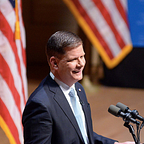Investing in Public Safety and Why It Matters
The safety of Boston’s residents is always the top priority for me as Mayor. Every member of our community should feel safe in their neighborhood, and providing the adequate resources to accomplish that plays a key role in our budget decisions each year. This is why we are investing in the full spectrum of public safety in this year’s proposed budget — from prevention, to intervention, enforcement, and mental health supports.
Our investments in the recommended budget and capital plan provide a comprehensive and multi-disciplinary approach to violence prevention and public safety that emphasizes opportunities and pathways away from violence. The BPD budget investment represents a 3.8 percent, or $14.6 million, increase over the previous fiscal year.
It’s important to think of public safety investments not only as funding to have enough police officers to respond to calls, though that’s extremely important. It’s also about funding the initiatives and programs that can prevent crime and violence in our neighborhoods.
Boston’s public safety professionals work every day to increase positive interaction with local youth, strengthen community relations, and listen to and address the public safety concerns of residents. One of the ways we do this is through our 32 street workers, who reduce crime and violence in the community by building meaningful relationships with youth in need. In FY19, we’re investing $1.6 million in the street worker program. This investment will help bring more social services to promote safe neighborhoods in the city and bring more resources to youth and families.
In a growing city, we also need to ensure that we have a robust, effective and accountable police department that better reflects the communities it serves. What does that mean? Not only are we adding 30 officers to our department for a total of over 2,210 officers that will give us the capacity to bolster the City’s community-policing efforts, but we are also working hard to make BPD as diverse as Boston itself. We’ve had great success since I reinstituted the police cadet program 2015, and we’re going to build on that again by adding another class of 20 cadets in the spring of 2019. This addition of 20 cadets will continue to provide a stable pipeline of diverse young people for future police officer classes.
BPD will also continue to focus on new technological improvements including the rollout of additional mobile devices to officers; security upgrades at the evidence storage facility; additional automatic license plate recognition cameras; and the fourth year of the department-wide $56 million radio replacement project.
I am also dedicating $2 million towards a police-worn body camera program, and while we await the final results from a study, we aim for this program to better protect our residents and our police force. Boston has become a model for strong community policing and our goal is to continue building trust and positive relationships between residents and law enforcement. As Boston continues to grow as a city, and as technology continues to evolve, it’s important that our public safety services grow alongside to keep Boston safe and make a positive impact in our neighborhoods.
The City works hard to ensure that we a continuum of follow-up support to ensure individuals and families who experience traumatic events have the support to recover. This year, I’m planning for an additional investment of $284,000 towards our Neighborhood Trauma Teams, bringing the total investment to $1,284,000. These teams offer immediate support to Boston residents in need, like those who have lost a loved one to violence, and direct them to ongoing trauma treatment. This year’s investment will further strengthen the existing neighborhood trauma teams and one citywide mobile team. It will complete the formation of an additional neighborhood team in Dorchester, announced last year, to provide greater community outreach and support. Our goal is to provide the resources to stop the damaging cycle of violence and hardship in our communities by treating the root of the problem.
Finally, the City will continue some our successful initiatives and partnerships like Operation Night Light, where BPD Officers accompany probation officers on home visits to probationers to offer support and connections to services. Our police department also works with the Boston Public Health Commission to coordinate transition services that support a continuum of street outreach and engagement, needs assessment and evaluation, intensive case management, behavioral health counseling, and employment and education services.
Our budget demonstrates a strong commitment to keeping our neighborhoods safe and secure. We want all residents to feel not only safe in their neighborhoods, but also proud to call it their home. From community policing initiatives, to accountability measures, to having enough officers to help you when you need it most, or even providing the support and guidance after a traumatic experience, Boston is ready to step up and serve our residents in every capacity.
The City’s FY19 budget was formally released today, and we encourage residents to visit budget.boston.gov to find out more information about investments being made in their community.
